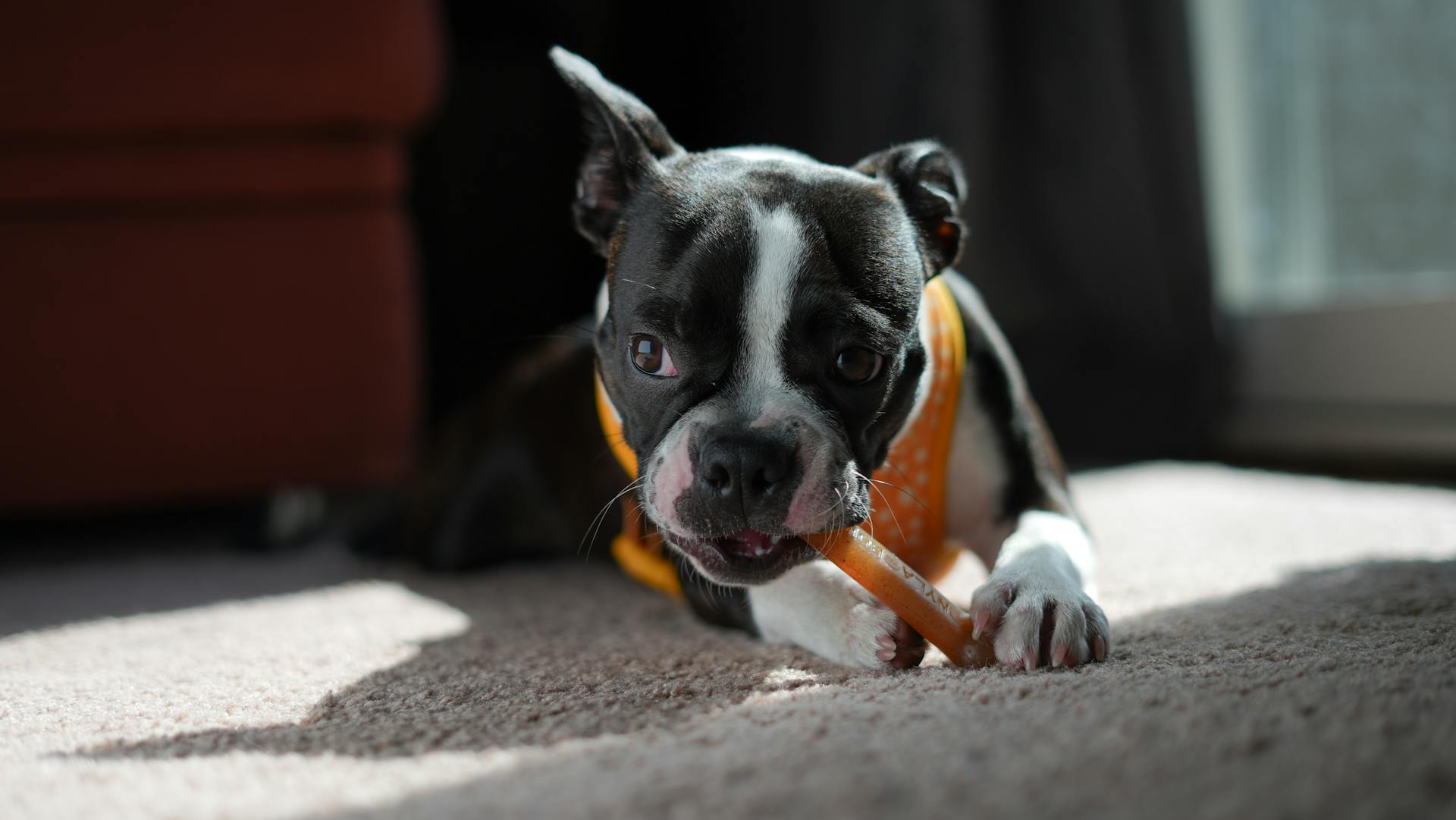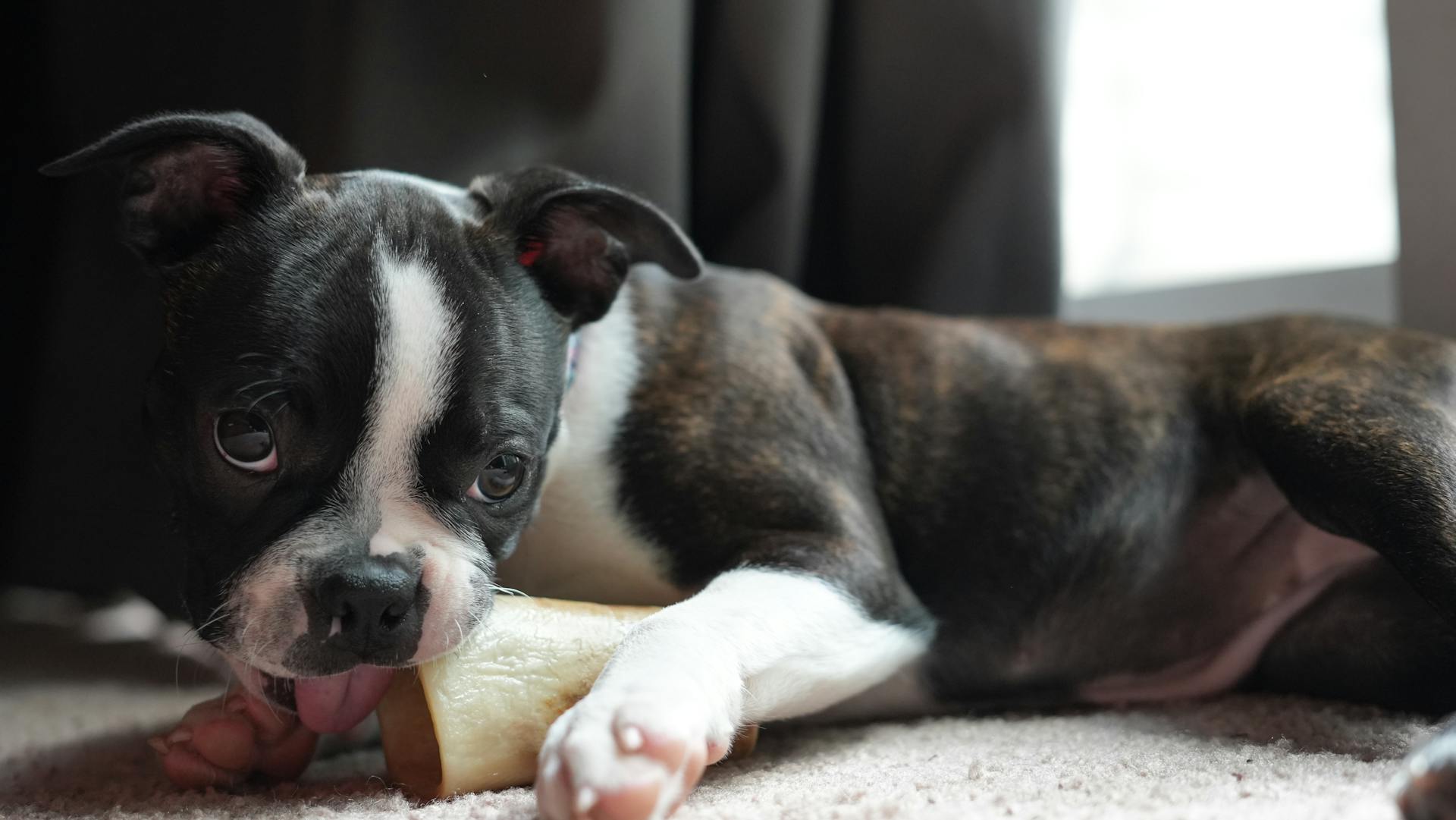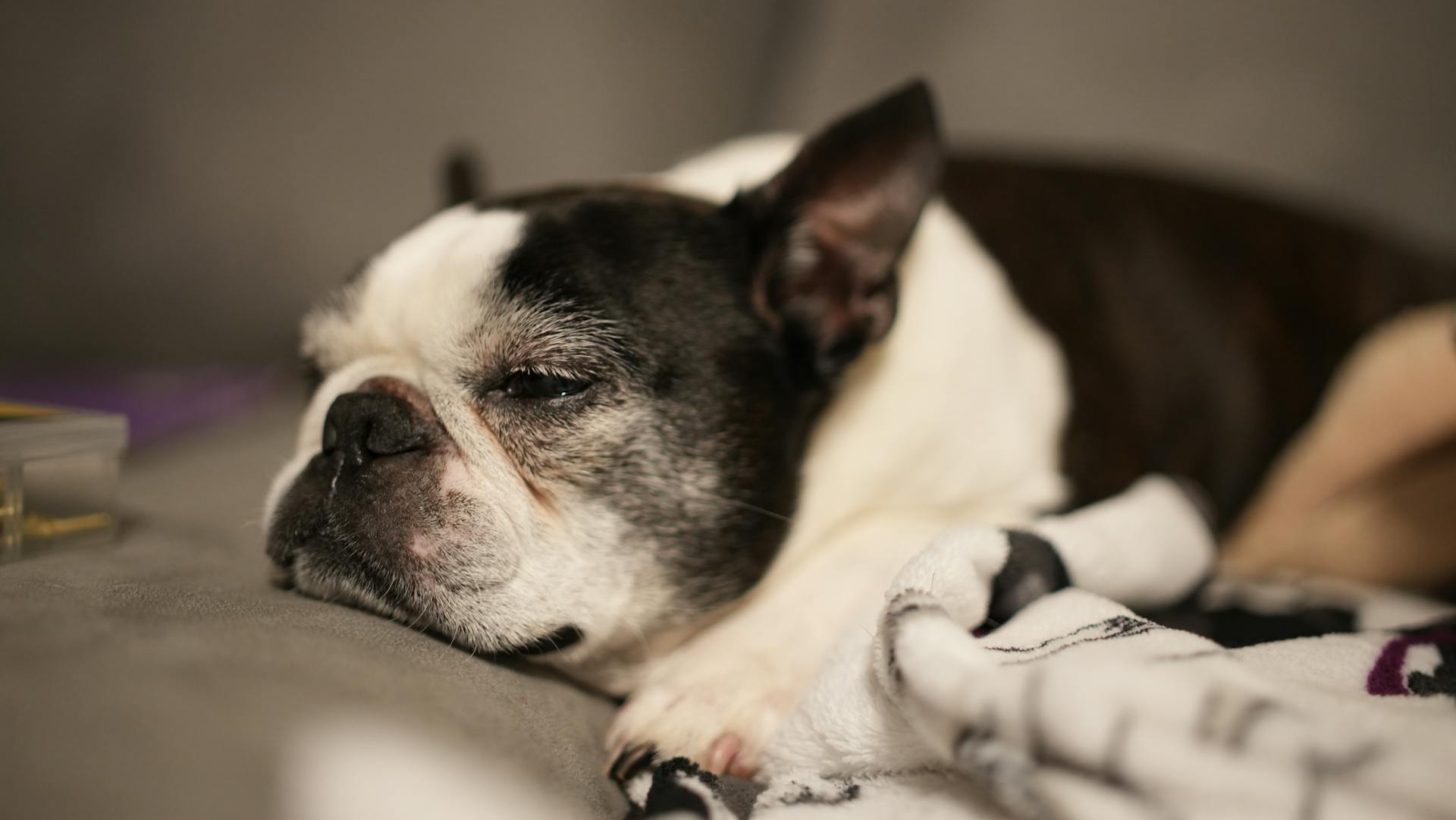
Boston Terrier dandruff can be a frustrating issue for many owners, but understanding the root causes can help you address the problem effectively.
Boston Terriers are prone to skin issues due to their brachycephalic (flat-faced) skull structure, which can lead to skin folds and moisture accumulation.
Regular grooming is essential to prevent skin problems in Boston Terriers, but it's not enough to just brush their coats - you also need to clean their skin folds regularly.
This can be achieved by gently wiping the skin folds with a damp cloth, ideally after a bath or shower.
A unique perspective: Boston Terrier Reverse Sneezing
Causes and Symptoms
Boston Terrier dandruff can be caused by various factors, including food allergies, environmental allergies, and even certain shampoos or medications.
Food allergies can produce rashes over a Boston Terrier's body, and symptoms like vomiting or decreased energy can also occur.
Environmental allergens, such as pollen, mold, and dust, can easily make their way through a Boston Terrier's short coat to their skin from carpeting or grass, leading to itchy red bumps.
A unique perspective: Boston Terrier Allergies
Fleas and mites can also cause a strong reaction in some cases, resulting in itchy areas with hair loss at the site of bites.
Boston Terriers with skin allergies may exhibit symptoms like red, itchy bumps that have a similar appearance to acne, hair loss, and a stained coat.
Dandruff in dogs, including Boston Terriers, occurs when dead skin cells flake off at a more prolific rate than usual, settling on the fur or hair on their body.
These dry flakes tend to accumulate on the back, particularly near the tail, and can be noticed when petting or scratching your dog.
Just like human skin, a dog's skin has glands that produce sebum, which helps to keep the skin hydrated and supple.
Recommended read: When Does a Boston Terrier Stop Growing
Treatment and Remedies
Bathing your Boston Terrier with a hypoallergenic shampoo can help calm the skin's surface and provide relief from itchy skin and hot spots. Look for ingredients like tea tree oil, hydrocortisone, and aloe vera that reduce skin inflammation.
Regular grooming is essential to remove dead hair and prevent oil buildup, which can exacerbate dandruff. Check with your vet before using grooming products on your dog.
A combination of regular bathing, grooming, and using a humidifier can help prevent dry skin and reduce dandruff symptoms. Your vet may prescribe a medicated shampoo for your dog, so be sure to follow the instructions carefully.
For more severe cases, your vet may recommend a fresh food diet or supplements like Omega-3 fish oils to improve your dog's overall health and fight against skin issues.
Here are some tips for bathing your Boston Terrier:
- Groom your pet regularly to ensure their skin isn't overly oily and removes dead hair.
- Bathing your dog can help with dandruff outbreaks and bacterial and fungal skin infections.
- Use a medicated shampoo if prescribed by your vet, and follow the instructions carefully.
- Rinse thoroughly after all baths to prevent skin irritation.
Treatment Options
If your Boston Terrier is suffering from itchy skin and hot spots, a hypoallergenic shampoo can provide relief. Look for ingredients like tea tree oil, hydrocortisone, and aloe vera that help reduce skin inflammation.
For more severe cases, over-the-counter antihistamines, prescribed corticosteroids, and topical antibiotic sprays and ointments may be necessary. Your veterinarian can help you determine the best course of treatment.

If you suspect a food allergy, a food trial or elimination diet can be an effective way to identify the culprit. This involves feeding your dog a new, simple ingredient diet for at least eight weeks, and then reintroducing specific ingredients to see which ones cause a reaction.
Here are the steps to follow for a food trial:
- Feed your Boston Terrier a new, non-contaminated diet for at least eight weeks.
- Choose a diet with single sources of animal protein, vegetable protein, and carbohydrate calories.
- During the trial, avoid treats, table food, supplements, and flavored medications.
- After eight weeks, slowly reintroduce specific ingredients and monitor for reactions.
Partnering with your veterinarian, an allergist, or a board-certified veterinary nutritionist can help you develop a fresh food diet that addresses your dog's specific needs.
Treating Other Conditions
Treating your dog's underlying health conditions is crucial to their overall health and comfort. Your dog may need antibiotics for bacterial infections, antifungals for fungal infections, or steroids and/or immunosuppressants for immune-mediated disorders.
Allergy testing and medications may also be necessary to address any allergies contributing to your dog's skin issues. Once the underlying condition is addressed, your dog's skin will be healthier and they'll be much more comfortable.
Recommended read: Boston Terrier Issues
Allergies and Health
Allergies can be a major contributor to Boston Terrier dandruff. Boston Terriers have a hypersensitive immune system, making them prone to developing allergies from a wide range of sources, including food, medications, and environmental allergens.
Common allergens that can cause skin issues in Boston Terriers include food ingredients like corn and soy, which are often found in commercial dry dog foods. Perfumes, shampoos, and cleaning products can also trigger allergic reactions in some dogs.
If you suspect your Boston Terrier has a food allergy, an elimination diet can help identify the culprit. This involves removing all suspected causes from their diet and adding them back in one at a time to see which one triggers a reaction. Environmental allergens, on the other hand, can be managed with antihistamines or by avoiding exposure to the allergen altogether.
Some common symptoms of Boston Terrier allergies include red, itchy bumps, hair loss, and a stained coat. If left untreated, allergies can lead to chronic itchiness, discomfort, infections, and skin damage. Regular inspections of your dog's coat can help you catch these symptoms early on.
Here are some common causes of Boston Terrier allergies:
- Food allergies
- Environmental allergies
- Medication allergies
It's essential to work with your vet to determine the underlying cause of your Boston Terrier's allergies and develop a treatment plan to manage their symptoms and prevent further complications.
Susceptibility to Allergies

Boston Terriers are prone to skin allergies, which can be triggered by a variety of factors. These include environmental allergens like pollen, dust mites, and fleas, as well as food and medication allergens.
Their short, close coat makes it easier to spot skin issues, but also means they're more susceptible to skin problems. Red, itchy bumps are a common symptom of Boston Terrier allergies, often accompanied by hair loss, a stained coat, or greasy skin.
A hypersensitive immune system is to blame for Boston Terriers' tendency to develop allergies from a wide range of sources. These can include medications, perfumes, shampoos, cleaning products, and food and flavor additives.
Common causes of Boston Terrier allergies include food allergies, environmental allergies, and medication allergies. No specific food or nutrient is a more common allergen than another, making it tricky to figure out where the problem lies.
Here are some common allergens that can trigger skin problems in Boston Terriers:
- Medications
- Perfumes
- Shampoos
- Cleaning products
- Dust mites
- Fleas
- Grass
- Pollen
- Food and flavor additives
- Household molds
Corn and soy are particularly common culprits of food allergies in Boston Terriers, often found in commercial dry dog foods.
Other Parasites
Other Parasites are a common issue for dogs, and they can cause a lot of discomfort. Cheyletiella mites, for example, are large enough to be seen with the naked eye and look very similar to white dog dandruff flakes.
These parasites live and feed on your dog's skin, causing him to be very itchy. They're similar to other external parasites like fleas, ticks, and Demodex and Sarcoptes mites.
Broaden your view: Boston Terrier Similar Breeds
When to Seek Help
If your Boston terrier has mild seasonal or sporadic dandruff, it's probably nothing to worry about. However, it's always better to be safe than sorry.
If your Boston terrier is experiencing itchiness, an odor to the skin, excessive amounts of dandruff, hair loss, red, irritated skin, or other signs of illness or discomfort, it's time to schedule an appointment with your veterinarian.
A physical exam will be necessary to diagnose the cause of your Boston terrier's dandruff. Your vet may also do a skin scrape to look for parasites, a culture test to check for fungal and bacterial infections, or blood work to check for underlying systemic disorders.
Here are some signs that indicate your Boston terrier needs to see the vet:
- Itchiness
- An odor to the skin
- Excessive amounts of dandruff
- Hair loss
- Red, irritated skin
- Other signs of illness or discomfort
Don't hesitate to seek help if you notice any of these symptoms in your Boston terrier.
Boston Terrier Specific
Boston Terriers are prone to skin issues due to their short, fine coats that can't regulate temperature well.
Their skin can become irritated and flaky, leading to dandruff.
Boston Terriers have a unique skin fold structure that can trap moisture and create an ideal environment for yeast and bacteria to grow, exacerbating dandruff.
Regular grooming is essential to prevent matting and tangling of their fur, which can contribute to skin irritation and dandruff.
A balanced diet rich in omega-3 fatty acids can help reduce inflammation and promote healthy skin.
Boston Terriers can be sensitive to certain ingredients in their food, so it's crucial to monitor their diet and adjust as needed to prevent skin issues.
Consider reading: Walking Dandruff Dogs
Frequently Asked Questions
Should I wash my dog if he has dandruff?
Yes, regular bathing is a key step in preventing and treating dandruff in dogs, along with proper grooming and skin moisturizing. Regular bathing helps keep your dog's fur and skin healthy and dandruff-free.
How do you get rid of dandruff on a dog fast?
Use an anti-dandruff shampoo specifically formulated for dogs, as human shampoos can make dandruff worse. Look for dog shampoos with oatmeal to help soothe itchy skin
Why does my dog have white flakes in her fur?
Dandruff-like flakes in your dog's fur can be caused by an imbalance of skin oils, either too much or too little, leading to skin irritation and flaking
Sources
- https://www.nomnomnow.com/learn/article/boston-terriers-skin-allergies
- https://seapet.com/boston-terrier-skin-allergies/
- https://www.dailypaws.com/dogs-puppies/health-care/dog-conditions/dog-dandruff
- https://www.vravet.com/site/blog/2023/01/15/how-to-get-rid-of-dandruff-in-dogs-causes--treatment
- https://www.fynnandfriends.com/boston-terrier-shedding-issues-tips/
Featured Images: pexels.com


